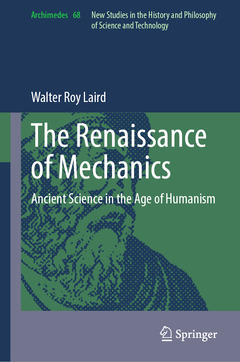The Renaissance of Mechanics, 1st ed. 2024 Ancient Science in the Age of Humanism Archimedes Series, Vol. 68
Auteur : Laird Walter Roy

This book gives an account of the origins of theoretical mechanics in antiquity, its limited reception in the Arabic and Latin Middle Ages, and its recovery and subsequent development in Italy to the time of Galileo. From late antiquity to the fifteenth century, the ancient science of mechanics?the theory of machines?was almost completely unknown in the Latin west. Then, from the mid-fifteenth century on, Italian humanists began to recover the ancient texts, and from them through the sixteenth century Italian mathematicians restored the ancient science of mechanics. The Renaissance of Mechanics first examines the principal ancient works on mechanics?the Aristotelian Mechanical Problems, the mechanical geometry of Archimedes, and Hero?s Mechanics?and then describes their limited reception in the Arabic world and their even more limited transmission to the medieval Latin west. It then traces their recovery in the fifthteenth century and their assimilation inthe sixteenth by Niccolò Tartaglia, Francesco Maurolico, and Guidobaldo dal Monte, culminating in Galileo?s rediscovery of Hero?s lost mechanical principles. The book ends with an examination of Galileo?s mechanics and its relation to his new science of motion, and suggests how modern mechanics would emerge from these ancient roots. Detailed analyses of these works offer new insights and interpretations while remaining accessible to general historians. TheRenaissance of Mechanics will be of especial interest to those working in the fields of renaissance humanism and the history of ancient, medieval, and renaissance science and mathematics.
Part I: Ancient mechanics.- Chapter 1. Devices and desires.- Chapter 2. Archimedes mechanicus.- Chapter 3. The Alexandria quartet.- Part II: Mechanics in the middle ages.- Chapter 4. The medieval science of weights.- Part III: The renaissance of mechanics.- Chapter 5. The recovery of ancient mechanics.- Chapter 6. Niccolò Tartaglia and the science of weights.- Chapter 7. Francesco maurolico and equal moments.- Chapter 8. Guidobaldo Dal Monte and Hero’s machines.- Chapter 9. Galileo and the lost principles of hero.- Conclusion.
Walter Roy Laird received his Ph.D. from the University of Toronto in 1983, where his graduate professors included Stillman Drake. He taught at Rice University as a Mellon post-doctoral fellow and at the Institute for the History and Philosophy of Science and Technology, University of Toronto, before joining the Department of History, Carleton University, Ottawa, where he taught medieval history and the history of science for over thirty years and where he is now Professor emeritus. Since 2016 he has been a Member of the Commissione scientifica dell’Edizione Nazionale dell’opera matematica di Francesco Maurolico. His publications on the history of mechanics include two books, one authored (The Unfinished Mechanics of Giuseppe Moletti [Toronto: University of Toronto Press, 2000]) and one co-edited (Mechanics and Natural Philosophy before the Scientific Revolution, edited with Sophie Roux [Dordrecht: Springer, 2008]), and a number of articles and chapters.
Date de parution : 11-2024
Ouvrage de 525 p.
15.5x23.5 cm



